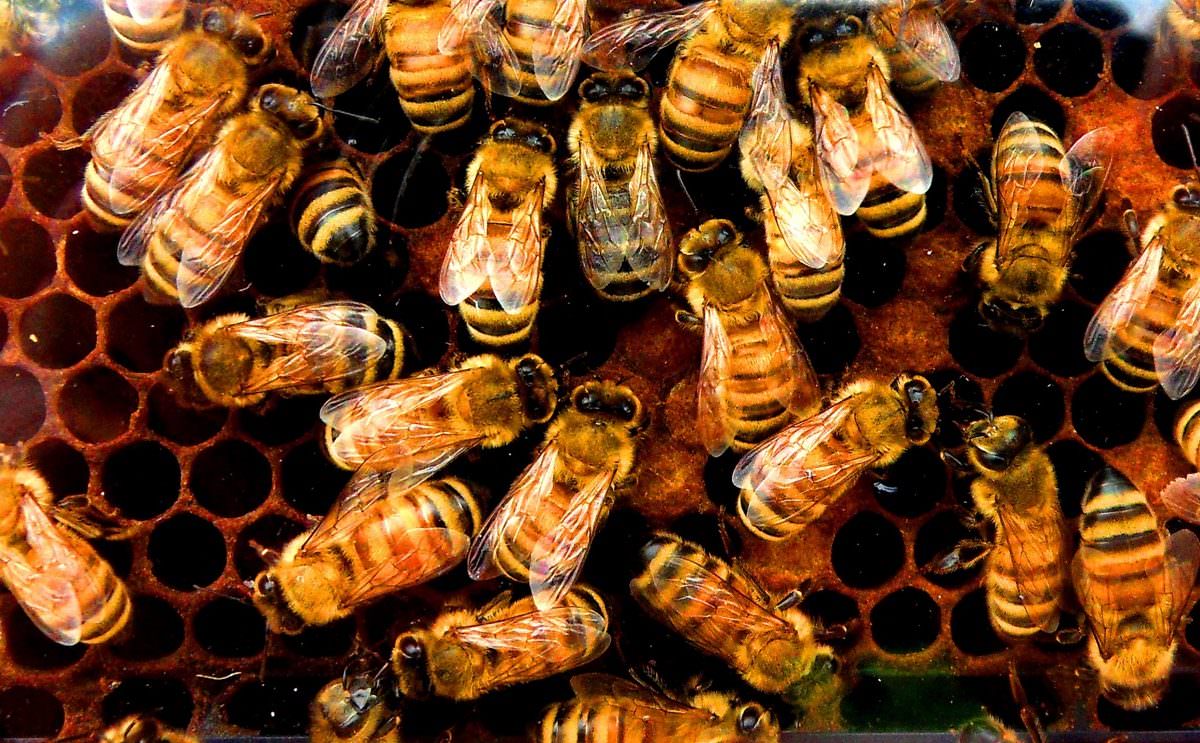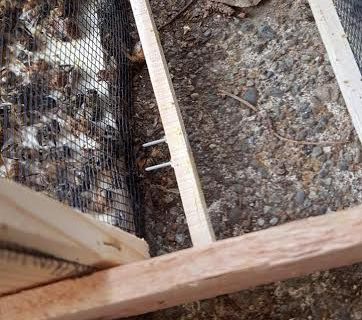Box Of Bees Breaks Open On Flight To Alaska
The airline says they were packed incorrectly. The beekeeper disagrees.
Box Of Bees Breaks Open On Flight To Alaska
The airline says they were packed incorrectly. The beekeeper disagrees.

But growing fruits and vegetables in Alaska isn’t easy, especially on a commercial scale. Aside from the short growing season, a major issue is a lack of pollinators. And one very weird story about a broken box of bees on an airplane illustrates this very point.
According to a paper from the University of Alaska at Fairbanks, nobody has yet figured out a way to keep a hive of honey bees – the world’s most popular agricultural pollinator – from dying during the harsh Alaskan winters. Instead, farmers will import bees each spring, typically from down the coast in Washington or elsewhere in the Northwest, and restock their hives for each growing season.
This begs the very weird question of, well, how do you get a hive of bees to Alaska? There are actually a few options. As it turns out, it’s legal to ship a box of bees via the United States Postal Service; few live animals are permitted, but honeybees are on the shortlist. It’s more economical, however, and thus more common, to ship bees via airlines, and Alaska Airlines is one of the most popular carriers.
That’s why it was so weird when Northwest Bee Supply, a company based in Washington state, announced on its website via large, Comic Sans font that Alaska Airlines had banned the shipment of all bees after having damaged some of its shipments. Here’s a quote from that website post, which we’re just going to go ahead and share as an image:
I reached out to Alaska Airlines to find out what the heck happened. Two boxes of bees broke on a flight? And now one of the top bee couriers is banning their transportation? What? Well Bobbie Egan, the airline’s media relations director, clarified the situation for us: “Alaska Airlines and Alaska Air Cargo have NOT banned shipments of bees,” he wrote in an email. “We’ve supported bee movements to Alaska for years, shipping on average 24,000 pounds of bees a year. Just [Monday] we moved three shipments of bees and three more went out [Tuesday], with several more shipments planned before the season ends.”
So what happened here? Here’s Egan again:
It is true that we banned one bee shipper from Portland when he repeatedly did not pack his insects correctly in two separate shipments. The packaging of his shipments last Thursday arrived in ANC with loose netting, causing a number of bees to escape. Our employees did a great job of containing the bees without injury, but it was an unfortunate situation that we go to great lengths to avoid. We did offer to work with the shipper and train him how to safely package and ship his bees, however, he refused our offer. We did refund all charges.
Mike Radford, the owner of Northwest Bee Supply, vehemently denies Egan’s statement. He says that he packaged his bees the same way, in the same boxes, that he has for the past six or seven years, and that the broken box of bees was caused by inappropriate handling. “These guys were throwing them in the baggage compartment and bouncing them off other freight, and it’s like, you can’t do that with anything,” says Radford. “Especially bees!”

The episode just goes to show how hard farming can be in unexpected ways; few people realize that a farmer’s season can be killed by, say, rough handling of a package by an airline employee. But bees due for Alaska have to be ordered way in advance, and though Radford refunded his customers, they may not be able to find any more pollinators for this year’s crop.
Follow us
This work is licensed under a Creative Commons Attribution-NoDerivatives 4.0 International License.
Want to republish a Modern Farmer story?
We are happy for Modern Farmer stories to be shared, and encourage you to republish our articles for your audience. When doing so, we ask that you follow these guidelines:
Please credit us and our writers
For the author byline, please use “Author Name, Modern Farmer.” At the top of our stories, if on the web, please include this text and link: “This story was originally published by Modern Farmer.”
Please make sure to include a link back to either our home page or the article URL.
At the bottom of the story, please include the following text:
“Modern Farmer is a nonprofit initiative dedicated to raising awareness and catalyzing action at the intersection of food, agriculture, and society. Read more at <link>Modern Farmer</link>.”
Use our widget
We’d like to be able to track our stories, so we ask that if you republish our content, you do so using our widget (located on the left hand side of the article). The HTML code has a built-in tracker that tells us the data and domain where the story was published, as well as view counts.
Check the image requirements
It’s your responsibility to confirm you're licensed to republish images in our articles. Some images, such as those from commercial providers, don't allow their images to be republished without permission or payment. Copyright terms are generally listed in the image caption and attribution. You are welcome to omit our images or substitute with your own. Charts and interactive graphics follow the same rules.
Don’t change too much. Or, ask us first.
Articles must be republished in their entirety. It’s okay to change references to time (“today” to “yesterday”) or location (“Iowa City, IA” to “here”). But please keep everything else the same.
If you feel strongly that a more material edit needs to be made, get in touch with us at [email protected]. We’re happy to discuss it with the original author, but we must have prior approval for changes before publication.
Special cases
Extracts. You may run the first few lines or paragraphs of the article and then say: “Read the full article at Modern Farmer” with a link back to the original article.
Quotes. You may quote authors provided you include a link back to the article URL.
Translations. These require writer approval. To inquire about translation of a Modern Farmer article, contact us at [email protected]
Signed consent / copyright release forms. These are not required, provided you are following these guidelines.
Print. Articles can be republished in print under these same rules, with the exception that you do not need to include the links.
Tag us
When sharing the story on social media, please tag us using the following: - Twitter (@ModFarm) - Facebook (@ModernFarmerMedia) - Instagram (@modfarm)
Use our content respectfully
Modern Farmer is a nonprofit and as such we share our content for free and in good faith in order to reach new audiences. Respectfully,
No selling ads against our stories. It’s okay to put our stories on pages with ads.
Don’t republish our material wholesale, or automatically; you need to select stories to be republished individually.
You have no rights to sell, license, syndicate, or otherwise represent yourself as the authorized owner of our material to any third parties. This means that you cannot actively publish or submit our work for syndication to third party platforms or apps like Apple News or Google News. We understand that publishers cannot fully control when certain third parties automatically summarize or crawl content from publishers’ own sites.
Keep in touch
We want to hear from you if you love Modern Farmer content, have a collaboration idea, or anything else to share. As a nonprofit outlet, we work in service of our community and are always open to comments, feedback, and ideas. Contact us at [email protected].by Dan Nosowitz, Modern Farmer
May 10, 2017
Modern Farmer Weekly
Solutions Hub
Innovations, ideas and inspiration. Actionable solutions for a resilient food system.
ExploreExplore other topics
Share With Us
We want to hear from Modern Farmer readers who have thoughtful commentary, actionable solutions, or helpful ideas to share.
SubmitNecessary cookies are absolutely essential for the website to function properly. This category only includes cookies that ensures basic functionalities and security features of the website. These cookies do not store any personal information.
Any cookies that may not be particularly necessary for the website to function and are used specifically to collect user personal data via analytics, ads, other embedded contents are termed as non-necessary cookies.